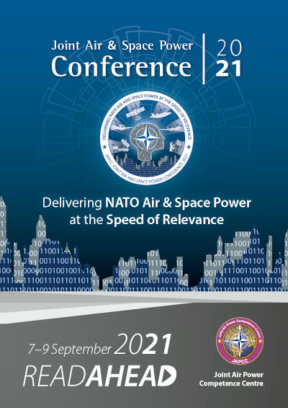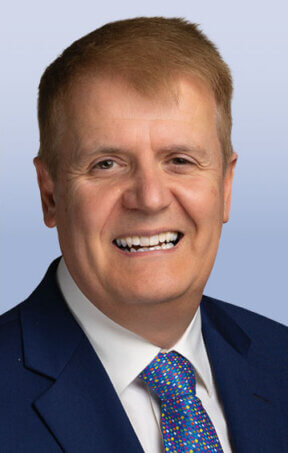Esteemed Colleagues,
I am extremely excited about the prospect of participating in the JAPCC’s Joint Air & Space Power Conference this year. Much can be achieved, as we have all learnt, through online ‘virtual’ meetings, but we have also experienced their limitations when compared to meeting ‘in real life’. I am currently imagining being in a large room with actual people, listening, meeting and chatting together, face-to-face, and then over coffee during the breaks. I wonder if any of us will remember how this ‘normal’ human interaction actually happens and how well we will adjust back to something we once took for granted?
As I write this on a dull early March morning in England, there are still four more weeks until I can visit the hairdressers and (legally) get a proper haircut – so at least another four weeks of getting a shock every time I look in a mirror. On the more positive side, I have just had my first vaccination shot and this seems to present the way out of this threat to all of us. But, whilst lockdown rules and regulations may have been different for all of us depending on our locations and personal circumstances, the challenges we face are more uniform – and they have continued to evolve. I do not just mean the challenges presented by the global pandemic, but also those presented by the changing world order.
The security challenges to NATO did not just get put ‘on hold’ as our individual countries turned inward to battle the existential threat to survival at home. Indeed, the global pandemic also presented an opportunity to NATO’s near-peer adversaries to manoeuvre and attempt to gain an advantage. How successful they may have been in doing this is, perhaps, yet to be determined, but we can be sure that any return to ‘business as usual’ for global defence and security will forever retain a watermark of the COVID-19 crisis – and be indelibly marked and changed by it.
The theme of the conference this year is ‘Delivering NATO Air and Space Power at the Speed of Relevance’, but what does this actually mean? In recent years, the term ‘speed of relevance’ appeared in several defence-related high-level papers. The 2018 US National Defense Strategy links the term to the need to reform processes in the US Department of Defense to facilitate quicker decision-making on the modernization of the armed forces. The term made its way subsequently in many NATO and NATO- related documents where it was used with respect to ensuring readiness, providing options to the Alliance as well as agile, flexible and effective Command and Control in support of NATO’s core tasks.
From my preliminary reading (outlined above) about this term, it is clear that – unlike the speed of light – the speed of relevance is a dependent variable. But what does it depend on and what are the metrics that can be used to measure ‘relevance’? This is something that I hope the five panels will explore in their discussions and I urge conference delegates to consider these points as well. The conference panels will explore how five key areas relate to the conference theme:
- Policy and Strategy
- Dynamic C2 Synchronized Across Domains
- Superiority in the Electromagnetic Spectrum
- NATO Space
The consultation process for the development of NATO’s Political Guidance 2023 which will provide decisive guidance for capability planning is supposed to start soon after our September conference. It is, therefore, extremely timely that the conference takes place when it does and that the JAPCC has managed to gather so many senior decision-makers and deep thinkers together in one place – from NATO and beyond. This conference represents a unique opportunity for us to spend a significant amount of time together, discussing and determining the challenges that we all face. In terms of conference outcomes, there is no reason why we should not aim high. However, we should also bear in mind that we will arrive in Essen in early September with a big bag of extremely complex questions. Even with all the firepower that the conference can muster, we will not, realistically, come away with the same big bag filled with all the answers to those same complex questions. What we can expect, and what we can all work towards will be a better understanding and, perhaps, a reframing of how we might react and adjust our thinking and our ways of doing business.
The JAPCC has worked tirelessly to get this conference back on track after the hiatus of the last year and a half. This year, once again, they have put together a carefully curated selection of articles which set the scene for each of the panels. If we are to take the most value from (and make the greatest contribution to) the panel discussions, we will need to read these articles in advance. In the days and weeks after the conference, I know that the JAPCC will continue to work tirelessly to construct a summary of what was discussed – and then use that summary to draw concrete conclusions to share with us all. I am delighted and proud to have been asked back this year to assist, in my own way, with these tasks. I look forward to meeting you all in September.
Bruce Hargrave BSc MBA
Independent Air and Space Power Advisor









